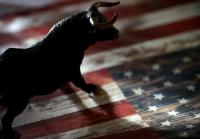Presidential Economics
Posted by Nathan Beauvais, CFP® on Mon, 07/08/2019 - 16:22
How much credit should a president get for a good economy? How much blame for a bad one? Contemporaries remain divided on this issue. We explore some key moments in our economic history, and the men that brought us through them.
Don't Panic!
Posted by Nathan Beauvais, CFP® on Tue, 06/25/2019 - 14:44
One of the most important pieces of legislation passed in the last one-hundred years was the Banking Act of 1933. While there were many issues the bill addressed, one component effectively ended bank runs in the US.
One Nation Under Regulation
Posted by Nathan Beauvais, CFP® on Wed, 06/12/2019 - 10:16
Regulation in a free market is like pulling weeds out of a garden; not enough and the garden becomes overgrown, too much and you start to pull the out the good plants with the bad ones.
What the Heck is an Emerging Market Anyway?
Posted by Nathan Beauvais, CFP® on Wed, 05/15/2019 - 14:50
While the investment returns associated with emerging markets can be attractive, it is important to understand the risk levels that come along with them. A brief history lesson can help explain the risk/reward relationship of this volatile asset class.
Is the Income Tax Unconstitutional?
Posted by Nathan Beauvais, CFP® on Wed, 04/24/2019 - 14:27
The US was one of the last developed nations to adopt a personal income tax. The reason lies in the US Constitution, and as always, the devil is in the details.
The Birth of Financial Advertising
Posted by Nathan Beauvais, CFP® on Mon, 04/08/2019 - 14:47
While Merrill Lynch may be a household name, Charlie Merrill, who started the company in 1914 is not. He was a visionary and his impact on advertising in the financial industry is second to none.
The Rise of the Fed
Posted by Nathan Beauvais, CFP® on Tue, 04/02/2019 - 09:57
Today, the Fed wields great power over the economy, however many may be surprised to learn that prior to 1913 the US did not have a central bank. It would take a severe banking panic in 1907 to convince politicians and their constituents that JP Morgan should not be the country's lender of last resort.
Trade War!!
Posted by Nathan Beauvais, CFP® on Wed, 03/27/2019 - 15:35
While many view the recent imposition of tariffs by the US as a break from their long established history as the center of global free trade, some may be surprised to learn just how important tariffs were in the establishment of the early US economy.
Buffett's Big Mistake
Posted by Nathan Beauvais, CFP® on Wed, 03/27/2019 - 15:33
Overconfidence can be a powerful force, leading us to ignore our better judgement. Look no further than the Oracle of Omaha, Warren Buffett, for proof on the blinding effect of investor overconfidence.
Mayday!
Posted by Nathan Beauvais, CFP® on Wed, 03/27/2019 - 15:30
On May 1, 1975 the NYSE changed a major way it was operating for over 150 years. It would open the door for people like Jack Bogle and Vanguard to start cutting costs to individual investors.
